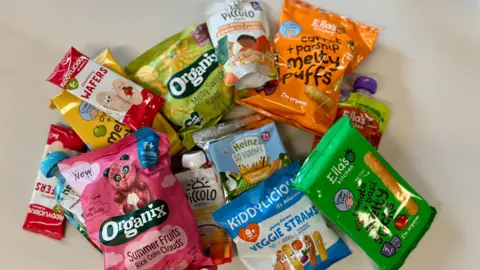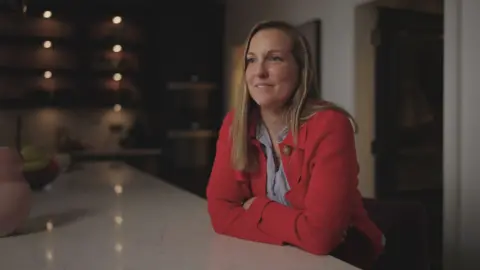Baby food firms told to cut sugar and salt
Manufacturers who do not make products healthier within 18 months may face action, the government says.

BBC News
 Getty Images
Getty ImagesBaby food manufacturers must cut levels of salt and sugar in their products and stop promoting snacks for babies under the age of one, the government has said.
The new guidance would also restrict the use of marketing claims that suggest health benefits without scientific evidence.
Firms that do not make their products healthier within 18 months may face action.
It comes four months after a BBC Panorama investigation found top-brand baby food pouches lacked key nutrients and parents were often being misled by marketing.
Manufacturers told the BBC they were committed to providing high quality and nutritious foods, and marketing and labelling them in a responsible way.
There has been significant growth in the baby food and drink market in recent years.
Food in pouches makes up more than a third of this market and there’s been a rise in sales of snacks like fruit and vegetable-based straws, puffs and wafers.
“Companies are dressing these products up as being healthy, when actually they’re much like a crisp or a sweetie. They’re putting profit before health,” says former chief nutritionist to the government, Dr Alison Tedstone.
“I hope an ethical business will stand back and think about the health of our children.”
In June, NHS advice was updated to tell parents they should not rely on baby food pouches as everyday meals, with experts believing they can cause health problems for children if used as their main source of nutrition.
These new government guidelines now turn to manufacturers – telling them to improve their products and ranges.
This has been a key demand of health campaigners who say it is companies that need to improve, so not all the pressure is on parents.
 Family photo
Family photoKristal, a mum of two from Leeds, has used commercial baby food to feed her son Austin, who is now two.
“Like most parents I take my children’s health and nutrition very seriously,” she told the BBC.
“[But] for far too long there have been misleading marketing messages about the nutritional value of baby food and implied ‘healthiness’ of some of the infant snack foods”.
Companies have previously been able to market products to babies as young as four months old, even though government guidelines state that solid foods should not be given to babies under six months.
Firms have also marketed snacks to infants under 12 months, when NHS guidance for parents says children under one do not need snacks.
The new guidelines say both of these practices should now be phased out, which could have significant ramifications for manufacturers.
Under the guidelines, sugar levels will be restricted in finger foods, snacks, desserts and non-refrigerated yoghurts, but there is no maximum level of sugar permitted in fruit pouches. This is despite many such products containing more sugar in a single pouch than a one-year-old should have in a day.
Companies have also been told to restrict the use of marketing claims on their products which are not based on scientific evidence.
Experts argue these claims often make products appear healthier than they really are, and sometimes even appear a better choice than homemade food.
Some leading baby food pouches carry labels such as “just good stuff” or “packed with goodness”, despite BBC Panorama finding some products to be low in key nutrients and very high in sugar.
But there is concern the guidelines are not clear on what is and isn’t permissible.
Dr Vicky Sibson, a public health nutritionist and director of the charity First Steps Nutrition Trust, describes them as “open to exploitation” by companies.

A version of these guidelines was first drafted five years ago by Public Health England for the then-Conservative government.
However, the guidelines were never published as prime ministers changed and new priorities came in during the Covid-19 pandemic.
Dr Alison Tedstone led the team that wrote those guidelines and told the BBC she hopes “this is the line in the sand”.
The guidelines are voluntary, and the government hopes they will be followed.
But none of the companies approached by the BBC responded when asked if they would adhere to the guidelines in full.
A public relations firm representing Ella’s Kitchen, a market leader, disputed whether some of its products fell under the guidelines relating to the advertising of snacks.
It told the BBC their carrot and parsnip melty puffs and tomato and basil melty sticks – advertised clearly as snacks on supermarket websites, and in the ”snacks and finger foods“ section on their own website – were actually intended to be used as part of a meal or ”picky plate”.
Dr Vicky Sibson called the Ella’s Kitchen response “disingenuous”, adding that parents regularly use such products as snacks. She said puffs and melty sticks were wholly inappropriate for use within main meals as infants need food that is high in nutrients.
Dr Tedstone said she heard such arguments time and time again from baby food companies and that it was “inevitable” some companies would not adhere to the guidelines.

The government says “additional or alternative measures” will be considered if businesses fail to implement these guidelines by February 2027.
Campaigners hope this would take the form of improved mandatory legislation. The government declined to specify if this was an option.
The guidelines apply in England only, but it’s expected that manufacturers will sell any updated ranges or products across the UK.
The British Specialist Nutrition Association (BSNA), an industry body that represents the biggest baby food companies including Ella’s Kitchen, Organix, Kiddilicious and Hipp Organic, told the BBC its members “have carried out significant improvements to recipes in recent years, including reducing sugar and increasing vegetable content, and continually review on-pack information”.
“We will continue to work towards the published guidelines,” it added. “Baby foods can play an important role alongside home-prepared meals and offer options for parents on-the-go.”
Heinz and Kiddilicious did not respond to the BBC. Organix and Ella’s Kitchen did not provide their own statements, referring us to the BSNA.
Piccolo said they “remain committed to evolving with the guidance to best serve families”.
Charlotte Stirling-Reed, a baby weaning expert and author, told the BBC that she hoped brands adhered “for the future health of children”.
She added that families should not feel guilty for having used the products.
“This is about making changes to the food products that are available for young children, not about shaming us as parents.”
Do you have more information about this story?
You can reach Catrin Nye by email at [email protected], or her Instagram account.





